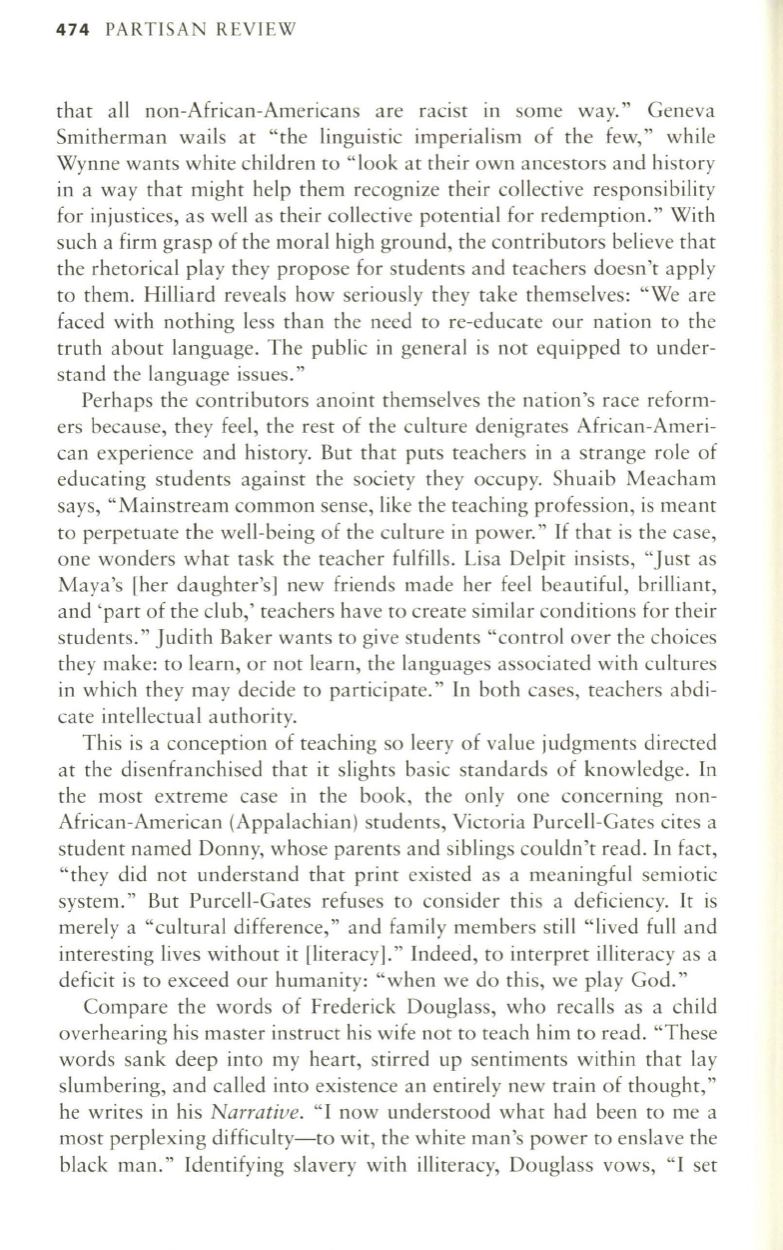
474
PARTISAN REVIEW
that all non-African-Americans are racist in some way." Geneva
Smitherman wails at "the linguistic imperialism of the few," while
Wynne wants white children to "look at their own ancestors and history
in a way that might help them recognize their collective responsibility
for injustices, as well as their collective potential for redemption." With
such a firm grasp of the moral high ground, the contributors believe that
the rhetorical play they propose for students and teachers doesn't apply
to them. Hilliard reveals how seriously they take themselves: "We are
faced with nothing less than the need to re-educate our nation to the
truth about language. The public in general is not equipped to under–
stand the language issues."
Perhaps the contributors anoint themselves the nation's race reform–
ers because, they feel, the rest of the culture denigrates African-Ameri–
can experience and history. But that puts teachers in a strange role of
educating students against the society they occupy. Shuaib Meacham
says, "Mainstream common sense, like the teaching profession, is meant
to perpetuate the well-being of the culture in power."
If
that is the case,
one wonders what task the teacher fulfills. Lisa Delpit insists, "Just as
Maya's [her daughter'S] new friends made her feel beautiful, brilliant,
and 'part of the club,' teachers have to create similar conditions for their
students." Judith Baker wants to give students "control over the choices
they make: to learn, or not learn, the languages associated with cultures
in which they may decide to participate." In both cases, teachers abdi–
cate intellectual authority.
This is a conception of teaching so leery of value judgments directed
at the disenfranchised that it slights basic standards of knowledge. In
the most extreme case in the book, the only one concerning non–
African-American (Appalachian) students, Victoria Purcell-Gates cites a
student named Donny, whose parents and siblings couldn't read. In fact,
"they did not understand that print existed as a meaningful semiotic
system." But Purcell-Gates refuses to consider this a deficiency. It is
merely a "cultural difference," and family members still "lived full and
interesting lives without it [literacy]." Indeed, to interpret illiteracy as a
deficit is to exceed our humanity: "when we do this, we play God."
Compare the words of Frederick Douglass, who recalls as a child
overhearing his master instruct his wife not to teach him to read. "These
words sank deep into my heart, stirred up sentiments within that lay
slumbering, and called into existence an entirely new train of thought,"
he writes in his
Narrative.
"I now understood what had been to me a
most perplexing difficulty-to wit, the white man's power to enslave the
black man." Identifying slavery with illiteracy, Douglass vows, "I set


